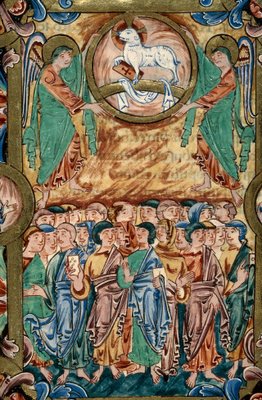From
Zenit:
Mass Could End With More Than "Go in Peace"
Holy See Approves 3 Alternative Closing Messages
VATICAN CITY, OCT. 14, 2008 (
Zenit.org).- The Holy See has approved three alternatives to "Ite, missa est," the final words said by the priest at Mass.Cardinal Francis Arinze, prefect of the Congregation for Divine Worship and the Sacraments, today notified the participants in the synod of bishops on the word of God about the new alternatives. The final message is currently rendered in English: "The Mass is ended, go in peace."
Benedict XVI has approved the alternatives, which were requested at the 2005 synod on the Eucharist to express the missionary spirit that should follow from the celebration of Mass.
According to Cardinal Arinze, the Pope had asked for suggestions to be presented. The congregation received 72, from which they prepared nine proposals. The Holy Father has chosen three.
The alternatives are in the revised third "editio typica" of the Roman Missal, which was printed last week, the cardinal said.
The alternatives are:
--"Ite ad Evangelium Domini nuntiandum"
--"Ite in pace, glorificando vita vestra Dominum"
--"Ite in pace" with "alleluia, alleluia" added during Easter season.
In English, these could be rendered along the lines of "go to announce the Gospel of the Lord"; "go in peace, glorifying the Lord with your lives"; and simply, "go in peace (alleluia, alleluia)."
The original Latin final message, "Ite, missa est," has not been modified.
Eucharistic compendium
Cardinal Arinze also announced that a Eucharistic compendium, also suggested by the '05 synod on the Eucharist, is nearly finished.
The book will define Eucharistic doctrine, benediction, Eucharistic holy hours, adoration, and prayers before and after Mass, he explained.
The cardinal further said that the Holy See, at the request of the Pope and the 2005 synod, is studying the most adequate moment during the Mass for the sign of peace.
The Holy Father indicated that episcopal conferences should consider two options: either before the "Agnus Dei" or after the Prayers of the Faithful. Each bishops' conference is to respond by the end of October, though there is a three-week grace period for late responses. The proposals will then be presented to the Holy Father, who will make a decision on the matter.
Finally, Cardinal Arinze announced that his congregation is preparing a volume with thematic materials for homily, with the aim of assisting and supporting priests throughout the world with their preaching.
 A new altar, with a traditional format, has been photographed in the place of the anvil-like iron structure which had been used as an altar under the Cathedra of Saint Peter, in Saint Peter's Basilica, since the time of the destruction of the Traditional altar (cf. our post "Liturgical Renewal at Saint Peter's: How does an altar disappear?").
A new altar, with a traditional format, has been photographed in the place of the anvil-like iron structure which had been used as an altar under the Cathedra of Saint Peter, in Saint Peter's Basilica, since the time of the destruction of the Traditional altar (cf. our post "Liturgical Renewal at Saint Peter's: How does an altar disappear?").















